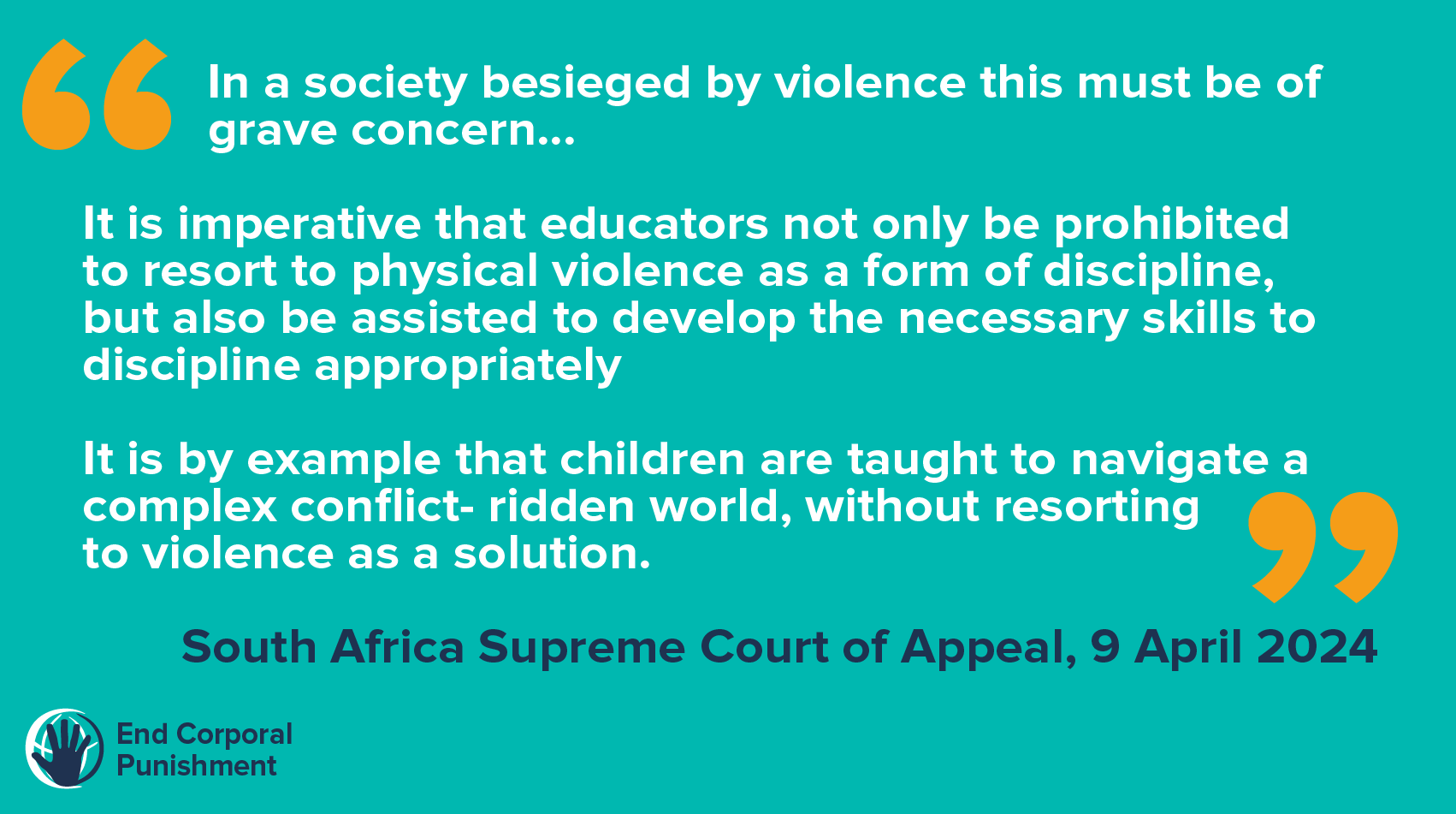South Africa 2024 Supreme Court of Appeal Judgment
Confirmation of prohibition of corporal punishment in schools – 9 April 2024- Centre for Child Law and Others v South African Council for Educators and Others - (1289/2022) [2024] ZASCA 45
This case concerns two teachers who severely assaulted students, on separate occasions, resulting in injuries and hospitalizations in both cases. In 2015, the first teacher hit two students with a piece of PVC pipe, leading one of them to undergo an emergency surgery for brain hemorrhage. In the second case, the teacher hit the student on the head which allegedly resulted in the student bleeding from her ear.
In 2019, with the support of child rights activists, the students’ respective parents reported the cases to the South African Council for Educators (SACE) for further investigations and sanctions. Using its internal policy, the SACE imposed the same sanctions to the teachers- irrespective of each case’s circumstances- and without involving the students’ parents in the proceedings. In a judgment delivered on 9 April 2024, citing section 28 of the Constitution, the South African Supreme Court of Appeal ordered that the SACE reconsider its decisions and sanctions to ensure that the exercise of its disciplinary powers is guided by its constitutional obligations to act in the best interest of the child. The Supreme Court argued that “a child and [its] family have a right to be heard and to participate in proceedings concerning the child”.
Concerning corporal punishment in particular, the Supreme Court highlighted that section 10 of the South African Schools Act 16 prohibits corporal punishment in all schools and “by doing so ensured that no child should be subjected to any form of physical violence in the school environment”. The Court ruled that “this legislative prohibition should have been the end of any notion that an educator is allowed or justified to use any form of physical violence against a learner.”
Referring to violent punishment in schools, the Court stated:
“In a society besieged by violence this must be of grave concern, and it cannot be gainsaid that violence as a form of ensuring corrective behaviour should be addressed at its roots. In the process of creating an environment that is conducive to the protection and development of children as citizens who will not resort to violence as a solution to conflict. It is imperative that educators not only be prohibited to resort to physical violence as a form of discipline, but also be assisted to develop the necessary skills to discipline appropriately and with the required measure of personal control. It is by example that children are taught to navigate a complex conflict- ridden world, without resorting to violence as a solution.” (para. 19)
In its ruling, the Court highlighted the need to monitor students’ wellbeing following the teachers’ violent actions: “SACE has a duty to assess, inter alia, the impact of the actions of educators on the children, including whether it is advisable that the educators return to the classroom; whether it is necessary to protect the children from harm; and, whether the underlying causes of the educator’s violent behaviour require addressing.” (para. 25)
In this regard, Judge Tolmay noted: “I would add to that, that the question of whether the child may need assistance psychological or otherwise to limit the harm done to her must also be considered.”
Note:
Corporal punishment is unlawful in all settings, including the home. In September 2019, the South African Constitutional Court confirmed a 2017 decision by the High Court of Gauteng which had found the common law defence of “reasonable or moderate chastisement” to be unconstitutional under sections 10 and 12(1)(c) of the Constitution.[1]
Corporal punishment is prohibited in schools under the South African Schools Act 1996 (section 10): “(1) No person may administer corporal punishment at a school to a learner. (2) Any person who contravenes subsection (1) is guilty of an offence and liable on conviction to a sentence which could be imposed for assault.”
[1] 18 September 2019, Freedom of Religion South Africa v Minister of Justice and Constitutional Development and Others, Constitutional Court, ZACC34; confirming 19 October 2017, YG v. The State, High Court of Gauteng Local Division, Case No. A263/2016
- Read our country report for South Africa
- See other national high-level court judgments on corporal punishment
- Read more about ending corporal punishment in schools


